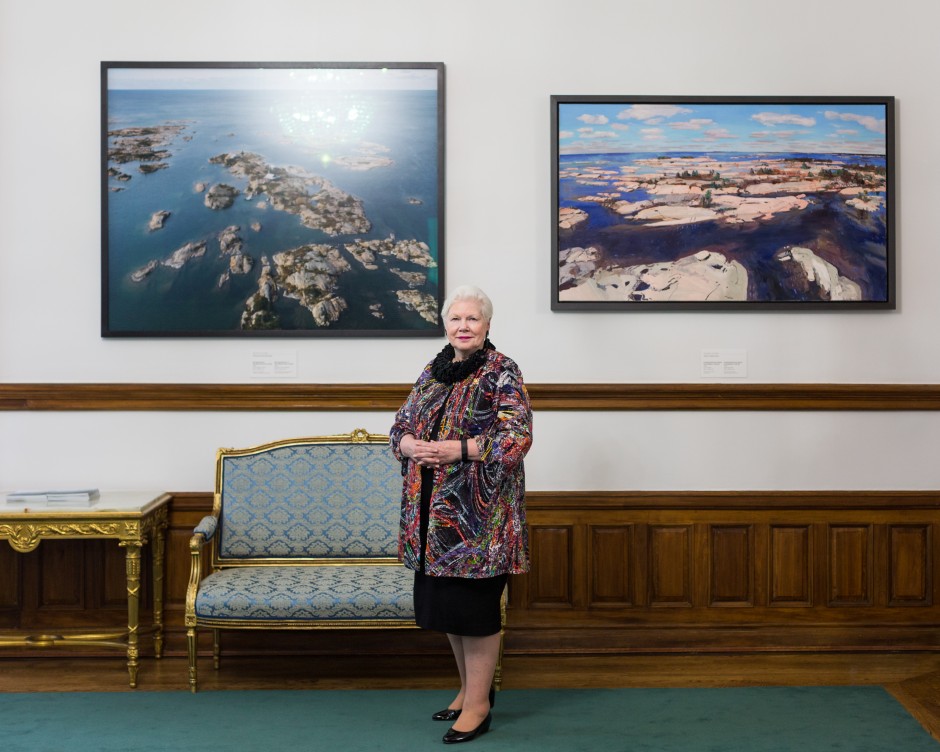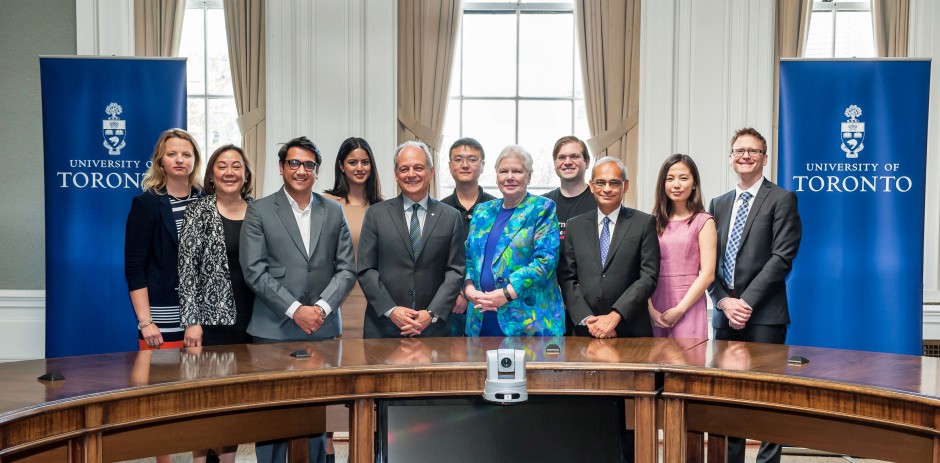[dropcap]L[/dropcap]ieutenant Governor Elizabeth Dowdeswell made her first official visit to the University of Toronto on May 17.
Visiting UTSG, Dowdeswell toured the labs at the Donnelly Centre for Cellular and Biomolecular Research; held a roundtable discussion with U of T President Meric Gertler and student entrepreneurs; and attended the Innovation Awards ceremony.
Dowdeswell served as the Executive Director of the United Nations Environment Programme and was previously an adjunct professor at U of T’s McLaughlin-Rotman Centre for Global Health. She was named Ontario’s twenty-ninth Lieutenant Governor in 2014 by former Prime Minister Stephen Harper.
The Varsity had a chance to sit down with Dowdeswell; we talked about her visit to U of T and her goals as Lieutenant Governor.
The Varsity: How would you describe the role that you play as Lieutenant Governor?
Elizabeth Dowdeswell: Well, I like to say that there are three facets to the role, one of course is the constitutional role. I represent Her Majesty the Queen in Canada and, consequently, have responsibility for ensuring there is good governance. So you’ll see weekly, I’m signing orders in council, of appointment, changes to regulation, those kind of things, being asked to royal assent to bills. And I do that on the advice of the Premier and Executive Council. I also have the responsibility of delivering a speech from the throne, of making sure that there is a Premier and Cabinet in place. I haven’t had to do that yet, but that’s part of the responsibility. And as well, the relationship with the royal family itself: we have a number of visits — both working visits and official visits — that contribute to their philanthropic work in this country and also their military work. So, that’s a good deal of what we do with the family.
Probably the thing that occupies us most are the responsibilities that we have to Ontario citizens. We visit people all over the province — north, south, east, and west — and have an opportunity to see what is of interest to them, to see what they are proud of, what they’re pleased about, and essentially have a chance to celebrate ordinary people doing extraordinary things all over the province.
And then the third thing is that each Lieutenant Governor has an opportunity to shine a light on important issues, issues that transcend politics. I’ve spent the first part of my tenure actually talking to Ontarians about what they think is important and have decided on two particular themes: Ontario and the world and sustainability.
TV: Given the non-legislative role of the Lieutenant Governor, how do you plan on making strides in these fields?
ED: Well, there’s a lot of opportunities that the Lieutenant Governor has to convene people, to bring people together to learn about issues, to learn from each other in a multidisciplinary setting, and to encourage what kinds of things people might be doing. So it really is a learning opportunity for people.
You’re right, I have a non-legislative role. I can’t develop laws or policy. I can’t be prescriptive, but we can bring people together. For example, we have an Aboriginal forum that brings Indigenous and non-Indigenous people together to learn about concerns. We did an exhibit not too long ago on a residential school as a way of helping people see the impact of residential schools on our past history.
We can bring people together to celebrate around certain issues, whether that’s the art exhibit downstairs [in the Lieutenant Governor’s suite] on the Great Lakes, which has to do with our identity as Ontarians… It tells the economic development story, and the environmental stewardship story, and the social cohesion story on the Great Lakes, and [it] exposes Ontario artists to a much broader community.
TV: Can you tell me more about your visit to U of T and what you had hoped to accomplish?
ED: I’ve had the good fortune to be on the U of T campus many times. It’s so conveniently close and I’ve had a bit of a history. I’ve had a chance to go through labs before and to see some of the real, impressive world-renowned work going on at U of T, but this was my first official visit and it was organized around the fact that there were awards being given out for inventions at the end of the day.
[pullquote]I can’t be prescriptive, but we can bring people together.[/pullquote]
But meanwhile, I had a chance to see the labs at the Donnelly building and had a chance to talk to some of the people managing and students working in those labs; had a chance to sit down in a round table with a number of students who are already innovators and entrepreneurs setting up their own companies; and had a great opportunity to hear about their companies and at what stage they were, how their development was going, what they were excited about, what the barriers were, and a whole range of really interesting possibilities actually on all three campuses.
So that was great and, of course, President Gertler and several others were able to talk about the research excellence, but also the whole focus on entrepreneurship and innovation that is a such a part of a very large institution like the University of Toronto. One of my real reasons for doing that is because innovation is really at that critical point between Ontario and the world and sustainability. It’s innovation that allows you to solve problems, to seize opportunities, and really to bring about a better quality of life. And so the opportunity to see what the issues were, that were currently being worked on, was particularly important.
The other thing I’ve discovered as I travelled around Ontario is that we’re not very good about telling the stories of what we do, and I think those need to get told much more frequently. So, I was busy gathering up stories yesterday when I talked to both undergraduates and post-graduates about what they were working on. It makes such a rich collection of stories that I can then talk to in other communities and even outside the borders of Ontario.
TV: What role do you see Ontario universities like U of T playing on the global stage?
ED: Oh, Ontario universities are key. First of all, they are among the best in the world. There are all kinds of metrics that show you how they’re number one, number 10, whatever it happens to be. So, I have no qualms about saying we are very fortunate because we have those intellectual resources.
I think there are so many ways in which we can serve our own population, but also make those discoveries, those innovations available worldwide. I mean the fact that we have world-renowned researchers —certainly we have a Nobel prize winner, [U of T chemist Dr. John Polanyi] — but we have many others as well that are winning prizes around the world, so they’re really contributing to global excellence and I think that’s a starting point.
And clearly the focus that is now being developed at the U of T campus on innovation through setting up incubators and giving students not only the skills that they have in the fundamental knowledge disciplines that they’ve studied in, but also to give them skills to be able to translate that into products for the marketplace is real proof.
TV: Did you have any final thoughts before we wrap up?
ED: We’re coming up to a very important moment in time and that’s Canada’s one hundred and fiftieth birthday and we will be celebrating, of course, but I hope it’s also a time when we pause and reflect a little as to how we can make this country even better — what kind of country do we imagine for ourselves in another 50.
So, I think the year ahead is going to be an exciting one, full of opportunities for creativity, innovation, and some real thoughtfulness about how we really take those values that we hold so dear as Canadians, such as social inclusion, and really make sure that we live up to those, but we also make sure that they’re firmly grounded for the next decades to come.
This interview has been edited for clarity and length.




